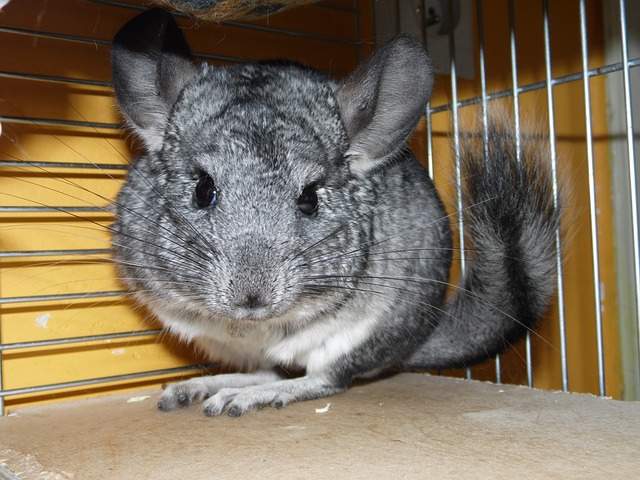
Have you thought about adopting a chinchilla? Are you worried about their potential odor?
Well, don’t stress. Unlike other rodents, chinchillas don’t smell. In fact, they are pretty much odorless (even their feces).
But, if you do notice a smell coming from your chinchilla, this is a sign that something might be wrong. You should probably take your chinchilla to the vet.
In this post, we are going to discuss the reasons why you might notice an odor coming from your chinchilla.
Why Do Chinchillas Smell?
As we discussed earlier, healthy chinchillas don’t smell. You really shouldn’t notice any odors coming from your chinchilla. But if you do notice an odor, something is wrong.
There are a few different reasons that you might notice a smell from your chinchilla:
- Dental issues
- Gastrointestinal issues
- Grooming issues
- Cage cleaning issues
Dental Issues
Chinchilla’s have large front teeth. Their teeth continue to grow during their entire lives. Wild chinchillas spend more time chewing than pet chinchillas. As chinchillas chew, they grind down their teeth. This helps keep their teeth at a healthy size.
But if your chinchilla isn’t grinding their teeth down, their teeth could grow very large. And this could cause a variety of dental issues. They might pierce the inside of their mouth and develop an infection. Or, they might have trouble controlling their drool.
Dental issues could quickly cause odors. If you notice a smell coming from your chinchilla (especially from their mouth), contact your vet.
Also, make sure your chinchilla has access to hay and chew toys. These will help keep their teeth small and prevent dental issues.
Gastrointestinal Issues
Normally, a chinchilla’s waste product does not emit any odors. Yes, their urine and feces are basically odorless (what a perk!)
But if you do notice an odor coming from their waste, this is a sign of gastrointestinal issues. Unfortunately, this probably means that your chinchilla is sick or their gastrointestinal tract isn’t functioning properly.
This could be caused by the food you are feeding your chinchilla. Make sure to feed your chinchilla a healthy diet. They should really only eat hay, chinchilla food pellets and water. Avoid feeding your chinchilla a diet high in fat or moisture. This will help your chinchilla maintain a healthy gut and prevent smelly feces.
Smelly waste products could also be a sign of a larger problem. Contact your vet if you notice a smell from you chinchilla’s waste products. Your chinchilla could have a serious gastrointestinal issue that is not just caused by their diet.
Grooming Issues
As most owners know, chinchilla’s are not supposed to get wet. If their fur gets wet, it forms uncomfortable clumps. Chinchillas also get chilled easily, so they might get sick if their fur gets wet.
So you don’t have to bathe your chinchilla (another major perk). But you still need to make sure they are properly groomed.
The good news is that healthy chinchillas know how to self-groom. Chinchillas use dust-baths to clean themselves. Two or three times a week, provide your chinchilla with a bowl of chinchilla dust. They will spend about 15 minutes cleaning themselves by rolling around in the dust. Make sure to remove the dust when they are done. Too many dust-baths can cause a chinchilla’s skin to dry out.
If you don’t provide dust, your chinchilla won’t be able to self-groom. This could lead to an odor. Or, if you notice that your chinchilla isn’t grooming even when dust is provided, you should contact your vet. This could be a sign of a more serious issue.
Cage Cleaning
Even though chinchillas don’t normally smell, you still need to clean their cage on a regular basis. When you clean their cage, you might find droppings that are causing a smell. If you do, contact your vet.
You should clean a chinchilla’s cage at least once a week. Consider using odor trapping chips to line their cage. This will help cut down on any natural, faint smells coming from their cage. Make sure to avoid cedar chips. These are actually toxic to chinchillas and can cause liver damage or allergic reactions. Instead, consider aspen or pine chips.
In addition to wood chips, you can line the cage with fleece, paper shreddings, hemp or corn cob. Just pay attention to the odors. Some cage linings are prone to mold.
With regular cleanings, a healthy chinchilla’s cage shouldn’t smell.
Final Thoughts
Chinchillas are popular pets for many reasons. These cute and soft creatures are affectionate and live for a long time.
But it doesn’t hurt that they are essentially odorless.
Just make sure you pay attention to any odors you notice coming from your chinchilla. This could be a sign that they are sick.
Do you have any experience with chinchillas emitting odors? We want to hear from you. Tell us your story below.
